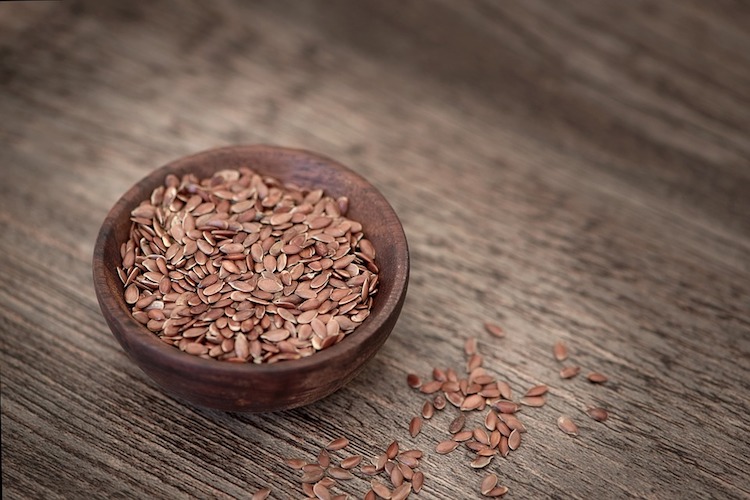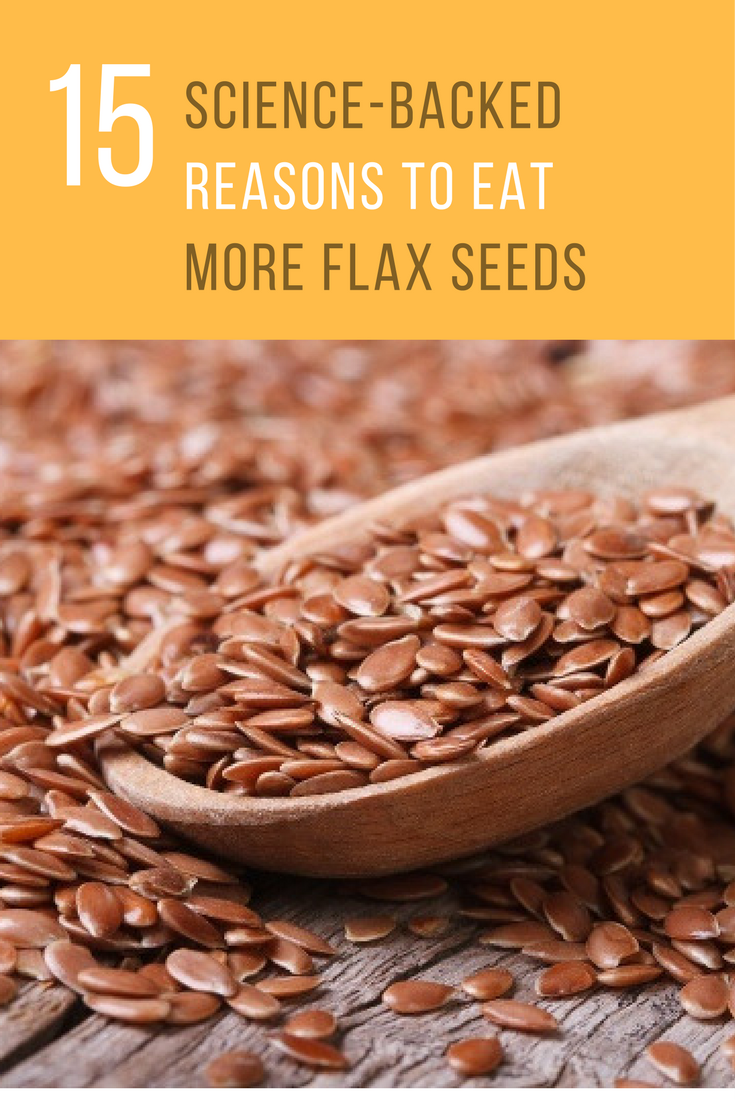
[adinserter block=”1″]
With all the so-called “superfoods” floating around on the internet these days, it can at times feel like this word is overused. How can you know which foods are truly superb in terms of their health benefits?
Flax seed is one of those genuine superfoods, with a history of healing and health benefits dating back 6,000 years. Research proving flax seeds have more plant-based omega-3 fatty acids than any other source.
Why is this important? WebMD reports that deficiencies in omega-3 fatty acids is now linked to some of the world’s most serious health conditions.
In this article, learn about 15 reasons why flax seed is “the” superfood you want to add to your daily health regimen!
[adinserter block=”4″]

1. Flax seeds offer the richest source of plant-based omega-3 fatty acids.
Omega-3 fatty acids are predominantly found in animal foods such as fish. Animal-based foods give you two types of omega-3 fatty acids: DHA and EPA. But to get the third type, ALA, you need a plant-based source. Just one ounce of flax seeds gives you 6,338 mg of ALA-type omega-3 fatty acids.
How does this benefit you? According to the American Journal of Clinical Nutrition, you don’t even need one full ounce per day to raise your body’s omega-3 content. 2.4 grams, or .085 ounces (0.17 TBSP) is sufficient.
2. Flax seeds are packed with lignans.
Lest you think omega-3 fatty acids are the only real reason to consume flax seeds, it is high time you meet lignans. As Dr. Mercola reports, lignans are a specific type of plant-based antioxidant called polyphenols.
he lignans in flax seeds help the body inhibit over-production of estrogen and regulate hormonal balance. Even more exciting: research conducted at Oregon State University’s Linus Pauling Institute shows a link between lignan activity in the body and a reduction in the size of breast cancer, prostate cancer and other hormone-related cancers.
3. Flax seeds support the growth of healthy gut probiotics.
Probiotics are such a popular dietary additive today they are being added to everything from orange juice to cottage cheese. Probiotics are actually living organisms – healthy bacteria.
The National Institutes of Health (NIH) has conducted and published a number of research studies to look at the various health benefits of consuming probiotics.
Research to date shows that maintaining strong levels of gut probiotics is linked to healthy digestive function, fewer illnesses and allergy symptoms, fewer side effects from digestive ailments such as IBS (irritable bowel syndrome), increased resistance to diarrhea as a side effect of taking certain medications and other positive effects as well.
When taken internally, the lignans and polyphenols (see 2. here for more) found in flax seeds not only promote healthy gut probiotics, but they also inhibit the candida yeast overgrowth that can lead to yeast infections.
4. Flax seeds offer an alternative to menopausal hormone replacement therapy (HRT).
Hormone replacement therapy, or HRT, has always been a controversial treatment. For some women entering menopause, HRT’s benefits outweigh the side effects, which can include an increased risk of developing breast cancer.
But for other women, and especially those with a family history of breast cancer, HRT may be too potentially dangerous to justify.
Flax seeds offer an alternative. The lignans and polyphenols in flax seeds naturally help the body control estrogen and hormone levels, which can alleviate the hot flashes, mood swings, mental fog, depression, anxiety, weight gain and other unpleasant side effects that often occur during menopause.
[adinserter block=”2″]
5. Flax seeds help to regulate weight.
According to the National Institute of Diabetes and Digestive and Kidney Issues (NIDDK), 60 percent of adults today are overweight and 30 percent are obese. No wonder our rates of diabetes, digestive issues and kidney diseases are skyrocketing!
Flax seeds to the rescue! The Journal of Nutrition reports that flax seeds help to control weight in a number of ways. Flax seeds offer high levels of soluble fiber, which can absorb water and fill the stomach, easing hunger pangs, food cravings and sugar cravings.
Flax seeds are also packed with the “good” fat, which can help to regulate blood sugar levels and make you feel satisfied after eating a meal.
Finally, flax seeds help ease body inflammation, especially in the gut (this effect comes from flax seeds’ ability to trigger optimal levels of healthy gut bacteria), which can help your body lose excess weight faster.
NOTE: To get the soluble fiber benefits of flax seeds, be sure to grind them up before consuming them.
6. Flax seeds help the body control blood cholesterol levels.
The Centers for Disease Control (CDC) states that the number of Americans suffering from moderate to severe levels of high cholesterol is estimated to be 102 million. Of these, approximately 35 million may have severely high blood cholesterol levels.
The type of cholesterol that needs to be kept lower is LDL (low-density lipoprotein) cholesterol. This is the “bad” cholesterol. According to the American Heart Association (AHA), elevated LDL cholesterol levels increase risk for stroke and heart attack.
The soluble fiber in flax seeds helps remove LDL cholesterol as it passes through your blood stream. Just by adding flax seeds to your diet daily, the National Institutes of Health (NIH) states you can lower your LDL cholesterol levels by up to 11 percent.
7. Flax seeds also help to regulate and reduce high blood pressure.
The ALA omega-3 fatty acids and lignans found in high concentrations in flax seeds have the ability to lower high blood pressure.
Penn State’s Milton S. Hershey Medical Center states that the effect is likely similar to that of adopting a Mediterranean diet that is low in saturated fats and high in omega-3 fatty acids.
8. Flax seeds regulate digestive issues such as constipation and diarrhea.
The International Foundation for Functional Gastrointestinal Disorders states that up to 45 million Americans and approximately 15 percent of people of all ages worldwide suffer from IBS, or irritable bowel syndrome.
IBS can be life-limiting in its side effects as the body struggles to regulate digestion and elimination. Since researchers still don’t fully understand what triggers IBS, treatment at this point revolves around simply prescribing helps that have been found to reduce side effects.
Flax seeds are one such help. The soluble fiber in flax seeds can help ease the side effects when taken on a daily basis, according to the Guardian. When taken in flaxseed oil or ground flax seed form, the expansion in the gut forms a soothing gel that then helps ease digestive discomfort and promote easier elimination.
9. Flax seeds can help ease the effects of diabetes.
Diabetes, linked as it is to obesity, has become a significant health problem nationwide today. While medical treatments do exist, often patients still find their disease challenging to manage.
Flax seeds have been shown to help increase insulin sensitivity in diabetes sufferers. In one study where participants took flax seeds in powder form every day (one tablespoon per day) for 12 weeks, their insulin sensitivity increased substantially.
10. Flax seeds are rich in immune system-boosting vitamins and minerals.
Until you read this article, you might have assumed the only way to get vitamin B6, Iron, potassium, copper, zinc, magnesium, manganese, selenium, phosphorus, vitamin B1 (thiamine) and molybdenum all together would be to take a multi-vitamin/mineral supplement.
Happily, you don’t need to add swallowing yet another pill to your morning routine to get all of this goodness. You can just take in flax seeds instead! Three tablespoons (1 ounce) daily will give you plenty of each vitamin and mineral.
11. Flax seeds help keep your body tissues and systems from becoming inflamed.
Body inflammation is what triggers the immune system to go into overdrive to help fight disease and restore balance. Too much inflammation on an ongoing basis can cause elevated cortisol levels (cortisol is the stress hormone) and lead to a weakened immune response over time. This, as you might imagine, can leave you susceptible to more serious health conditions.
Flax seeds can help to fight off inflammation, according to the Arthritis Foundation. Two tablespoons of ground flax seeds per day has 140 percent of the omega-3 fatty acids necessary to stave off inflammation.
As a side benefit, this can also reduce symptoms of osteoarthritis and rheumatoid arthritis.
12. Flax seeds keep your hair and skin healthy and shiny.
The ALA omega-3 fatty acid in flax seeds add in natural moisturizing agents to keep your skin youthful and fresh-looking and your hair healthy and shiny. Flax seeds can also help to stave off the genetic hair loss condition called Cicatricial alopecia.
Best of all, if you are suffering from adult-onset acne, consuming flax seeds can help keep your skin clear.
13. Flax seeds make sure your body gets full value from nutrients in your food.
Because flax seeds help to boost and maintain healthy levels of gut probiotics, your body is better able to make use of the good nutrients in your food. Also, flax seeds help transport less-ideal food compounds such as LDL cholesterol out of your body so they don’t harm you.
14. Flax seeds are naturally gluten-free.
If you have a gluten sensitivity as so many do today, flax seeds offer a naturally gluten-free alternative to gluten-based grains. Flax flour is also a fabulous flour for cooking so you don’t have to give up your favorite baked treats!
15. Flax seeds can improve your vision.
The omega-3 fatty acids in flax seeds help to moisturize your eyes naturally, according to the National Institutes of Health (NIH). This can keep your vision strong and clear for longer, especially when you take in flax seeds as oil, reports WebMD.
Give This Superfood a Try Today
In conclusion, flax seeds truly are one of the world’s premier super foods. They are packed with vitamins, minerals, nutrients, fiber that can be used in its soluble or insoluble form, omega-3 fatty acids, antioxidants, lignans and pretty much everything your body could ever want or need for better health.
If you are struggling with a health condition and have been told to try consuming flax seeds, this list might initially seem overwhelming. You do not have to do everything on this list! Just try one thing and see how it goes.
And remember, you can use flax seeds whole for their insoluble fiber benefits or ground up for their soluble fiber benefits. If you prefer, you can also take flax seed oil. There are plenty of options for using flax seeds in cooking, as a garnish, in smoothies or straight, so don’t be afraid to get creative and see what you like best!